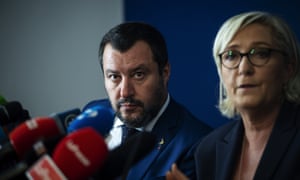The Guardian - Back to home
Populists are whipping up a storm as Europe faces lurch to the right
Nationalist groups across the continent are stoking anti-immigrant and Islamophobic sentiment to win seats in next month’s EU elections
 The far-right stuff … Matteo Salvini of Italy’s League and Marine Le Pen of France’s National Rally. Photograph: Antonio Masiello/Getty
The far-right stuff … Matteo Salvini of Italy’s League and Marine Le Pen of France’s National Rally. Photograph: Antonio Masiello/Getty
T
he battle for Europe is coming to a head – but, surprise, surprise, the main focus is not Brexit. Across the continent, far-right populist and nationalist parties are mobilising ahead of next month’s EU parliamentary elections. Polls show their support growing. For Europe’s newly energised hard right, Brexit is both a spur and a sideshow.
Whipping up anti-immigrant, Islamophobic and anti-semitic sentiment, and exploiting public anger over austerity and the perceived arrogance of the Brussels political class, the populists aim to reassert the pre-eminence of national identity, narrowly defined, and halt the European project in its integrationist tracks.
It is, as yet, a rag-tag army with myriad rivalrous leaders and policy differences. Some prominent figures, such as Matteo Salvini, leader of Italy’s far-right League, occupy senior government positions. Others, such as Thierry Baudet, who leads the insurgent Dutch populist Forum for Democracy and likes to quote Cicero (in dog Latin), are eccentrics whingeing on the fringe. But Europe’s multi-party mainstream coalitions, which currently dominate the EU parliament, and the grand panjandrums of the EU Commission, where top jobs depend on the election outcome, have been put on notice. The days of comfortable centrist majorities are coming to an end. The far-right is knocking at the door.
The parliament’s own polling confirms this trend. The biggest groupings, the centre-right European People’s party and the centre-left Socialists & Democrats, are each expected to lose dozens of seats, the latest survey suggests. If Britain does not participate, about 150 MEPs out of a total of 705 will represent Eurosceptic parties.
The Europe of Nations and Freedom bloc, which includes Salvini’s League and Marie Le Pen’s French National Rally (formerly the National Front), could swell to more than 60 MEPs. Separate polling by the Politico website predicts that mainstream parties, including the Liberal group allied to French president Emmanuel Macron’s En Marche, may fare even worse.
Far-right populists are not about to take control of the EU. But their enhanced sway will intensify tensions over EU integration, increase disruption and deadlock, and complicate the process of appointing a new commission. As Salvini and his supporters tell it, the evolving realignments could end Franco-German “hegemony” over the EU.
Across the continent, signs of approaching upheaval are unmistakable. An early augury may come this month in Spain’s general election, where Vox is set to become the first far-right party to win seats in parliamentary since the close of the Franco era.
Social media form part of the electoral battlefield. According to research by Alto Analytics, online supporters of far-right populist and nationalist parties are disproportionately deluging platforms such as Facebook and Twitter with anti-immigration, Eurosceptic posts.
Attempts to organise Europe’s far-right into a united, cohesive force are continuing apace, though with mixed success. Following previous meetings with like-minded politicians in Austria, Hungary and Poland, Salvini plans to host a rally involving up to 20 countries in Milan next month. On Monday he will hold talks with German, Finnish and Danish right-wingers. He wants a joint electoral platform akin to the League’s manifesto, which pledges to “underline and reaffirm common Christian roots, defend national identity and the supremacy of [national laws] over European laws and directives”. The manifesto also trumpets opposition to immigration, austerity and integration.
It’s unclear at this point whether leading lights on Europe’s populist right such as Le Pen, Hungary’s prime minister, Viktor Orbán, and Poland’s ruling party leader, Jarosław Kaczyński, will attend next month. This uncertainty reflects personal jealousies and policy differences, for example over engagement with Russia (which the Poles oppose and Salvini and Le Pen favour).
It’s plain that, like Europe’s mainstream parties, the populist-nationalist camp will struggle to unite around a shared vision. Speaking last week, the chief election candidate for Germany’s anti-Islam, anti-immigrant Alternative for Germany, Jörg Meuthen, said personality clashes would probably prevent the creation of a pan-European “patriotic alliance”. But he predicted big gains for the hard right and urged parties to work together.
That’s a lesson the pro-European mainstream also needs to heed. It, too, has an opportunity if it can be grasped. A Eurobarometer survey, published last year, found the highest level of support for the EU in 35 years, with two-thirds of Europeans believing their country had benefited from membership. Last month’s million-strong Remain march in London was “the greatest public outpouring of pro-EU sentiment that Europe has witnessed in years”, wrote analyst Mark Leonard. Yet at the same time, there appears little doubt eurosceptic forces have electoral momentum behind them.
Among Europe’s leaders, only Macron is actively making the case across national borders for a more deeply integrated, tolerant and reformed EU. He recently appealed directly to Europe’s citizens to reject the “anger-mongers” of the right and embrace “renewal”. Salvini and Orban, promoting a sinister-sounding new “European spring”, view Macron as opponent-in-chief.
If the far-right surge is to be repelled, Macron needs help. But strong leadership is lacking. Angela Merkel, Germany’s chancellor and a natural ally, is on her way out. Other pro-EU governments and parties are struggling with multiple policy splits of their own. An ugly brawl is in prospect over who will replace Jean-Claude Juncker as commission president.
And then there is Brexit, distracting attention from the main battlefront at a vital juncture. As Europe prepares for an imminent showdown with the forces of reaction, Britain’s dishonourable retreat from the fray might never be forgiven.

Geen opmerkingen:
Een reactie posten
Opmerking: Alleen leden van deze blog kunnen een reactie posten.